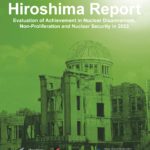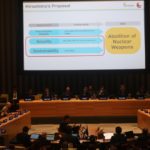(3) Treaty on the Prohibition of Nuclear Weapons (TPNW)
The number of countries signing and/or ratifying the TPNW which was adopted on September 20, 2017, has steadily increased. As the number of ratifying countries reached 50 on October 24, 2020, the TPNW entered into force on January 22, 2021, in accordance with Article 15 of the treaty. As of the end of 2021, 59 countries have ratified among the 86 signatories. Among the countries surveyed, those that have ratified are Austria, Chile, Kazakhstan, Mexico, New Zealand, Nigeria, the Philippines and South Africa, and those that have only signed are Brazil and Indonesia.
On the occasion of the treaty’s entry into force, UN Secretary-General António Guterres said in a video message that the TPNW is “an important step towards a world free of nuclear weapons,” and “represents a strong demonstration of support for multilateral approaches to nuclear disarmament.” He also stated, “The survivors of nuclear explosions and nuclear tests offered tragic testimonies and were a moral force behind the Treaty. Entry into force is a tribute to their enduring advocacy.” Furthermore, he emphasized, “Nuclear weapons pose growing dangers and the world needs urgent action to ensure their elimination and prevent the catastrophic human and environmental consequences any use would cause. …The elimination of nuclear weapons remains the highest disarmament priority of the United Nations. The Secretary-General calls on all States to work together to realize this ambition to advance common security and collective safety.”30
The first Meeting of the States Parties (MSP) under Article 8-2 of the TPNW was originally scheduled to be held in January 2022. However, it was rescheduled due to the global pandemic of COVID-19.
Proponent countries
As in the previous years, at the 2021 UNGA, a resolution was adopted titled “Treaty on the Prohibition of Nuclear Weapons,”31 which called upon all states that have not yet done so to sign, ratify, accept, approve or accede to the treaty at the earliest possible date, and “[invited] States not party to the Treaty, as well as the relevant entities of the United Nations system, other relevant international organizations or institutions, regional organizations, the International Committee of the Red Cross, the International Federation of Red Cross and Red Crescent Societies and relevant non-governmental organizations to attend the first Meeting of States Parties as observers.”32 The voting behavior of countries surveyed in this project on this resolution was as follows.
➢ 128 in favor (Austria, Brazil, Chile, Egypt, Indonesia, Iran, Kazakhstan, Mexico, New Zealand, Nigeria, the Philippines, South Africa, the UAE and others); 42 against (Australia, Belgium, Canada, China, France, Germany, India, Israel, Japan, South Korea, North Korea, the Netherlands, Norway, Pakistan, Poland, Russia, Turkey, the United Kingdom, the United States and others); 16 abstentions (Saudi Arabia, Sweden, Switzerland and others) – Syria did not vote.
Regarding the legal prohibition of nuclear weapons, the UNGA in 2021 adopted resolutions “Follow-up to the advisory opinion of the International Court of Justice on the legality of the threat or use of nuclear weapons”33 and “Convention on the prohibition of the use of nuclear weapons.”34 The voting behaviors of respective countries with respect to these resolutions were as follows:
➢ “Follow-up to the advisory opinion of the International Court of Justice on the legality of the threat or use of nuclear weapons”—a 143 in favor (Austria, Brazil, Chile, China, Egypt, Indonesia, Iran, Kazakhstan, Mexico, New Zealand, Nigeria, Pakistan, the Philippines, Saudi Arabia, South Africa, Sweden, Switzerland, Syria, the UAE and others); 33 against (Australia, Belgium, France, Germany, Israel, South Korea, the Netherlands, Norway, Poland, Russia, Turkey, the United Kingdom, the United States and others); 14 abstentions (Canada, India, Japan, North Korea and others)
➢ “Convention on the prohibition of the use of nuclear weapons”—125 in favor (Chile, China, Egypt, India, Indonesia, Iran, Kazakhstan, Mexico, Nigeria, Saudi Arabia, South Africa, Syria, the UAE and others); 50 against (Australia, Austria, Belgium, Canada, France, Germany, Israel, South Korea, the Netherlands, New Zealand, Norway, Poland, Sweden, Switzerland, Turkey, the United Kingdom, the United States and others); 13 abstentions (Brazil, Japan, North Korea, Pakistan, the Philippines, Russia and others)
NNWS not signing the TPNW
Among the NNWS surveyed in this report that have not signed the TPNW,35 Switzerland and Sweden stated early on that they would participate in the first MSP as observers, although they simultaneously reiterated that they could not sign the treaty in the present form.
In October 2021, the new Norwegian coalition government, which was formed after the general election in September, also announced that it would be the first North Atlantic Treaty Organization (NATO) member to participate as an observer in the MSP. In its election platform, the Labour Party, the core of the new government, stated, “The TPNW is a good initiative and contributes to increase stigma around nuclear weapons.
In the current security situation, it is not possible for NATO countries like Norway to sign without reducing our possibility for influence and protection. It should be a goal for Norway and other NATO countries to sign the TPNW.”36
Furthermore, in November, three parties—including the Social Democrats (SPD) and the Green Party, which established a new coalition government in Germany in December—agreed to participate in the first MSP as an observer in their coalition agreement, saying as follows: “In light of the results of the NPT Review Conference and in close consultation with our allies, we will constructively support the intent of the Treaty as an observer (not as a member) at the Conference of the Parties to the [TPNW].” In the meantime, regarding the issue of replacing Germany’s dualcapable aircraft (DCA), they stated in their coalition agreement, “We will, at the beginning of the 20th legislative term, procure a successor system for the Tornado fighter jet. We will accompany the procurement and certification process with respect to Germany’s nuclear sharing in an objective and diligent manners.” They further elaborated, “As long as nuclear weapons do play a role in NATO’s Strategic Concept, Germany has an interest in participating in strategic discussion and planning processes. Against the background of ongoing threats for Germany’s and Europe’s security we take seriously the concerns of our centre and eastern European partners, remain committed to the maintenance of a credible deterrence potential and want to continue the dialogue efforts of the Alliance”.37
On the other hand, the communiqué issued at the NATO summit in June 2021 made clear its opposition to the treaty, as follows:
We reiterate our opposition to the Treaty on the Prohibition of Nuclear Weapons (TPNW) which is inconsistent with the Alliance’s nuclear deterrence policy, is at odds with the existing non-proliferation and disarmament architecture, risks undermining the NPT, and does not take into account the current security environment. The TPNW does not change the legal obligations on our countries with respect to nuclear weapons. We do not accept any argument that the TPNW reflects or in any way contributes to the development of customary international law. We call on our partners and all other countries to reflect realistically on the ban treaty’s impact on international peace and security, including on the NPT, and join us in working to improve collective security through tangible and verifiable measures that can reduce strategic risks and enable lasting progress on nuclear disarmament.38
As for Japan, Prime Minister Fumio Kishida said in his inaugural press conference on October 4, 2021, “I believe that the TPNW is a very important treaty for a world without nuclear weapons. However, unfortunately, no NWS has joined the treaty.
As the only country to have experienced atomic bombings, I strongly consider that Japan must play a role in leading the NWS, including the United States, toward an exit to a world without nuclear weapons.”39
He also stated on December 21:
I consider that the TPNW is an important treaty that will be the way out toward a world without nuclear weapons. However, unfortunately, not a single NWS has joined this treaty. During my tenure as Foreign Minister for four years and eight months, I have strongly felt that in order to move the reality toward a world without nuclear weapons, it is vital to convince the countries actually possessing nuclear weapons to change. Therefore, as the only country to have experienced of atomic bombings during the war, Japan, as its responsibility, recognizes the importance of making efforts to move the United States which is Japan’s only ally and also the world’s largest NWS. Furthermore, I have stated that Japan should first build a relationship of trust with the United States regarding a move toward a world without nuclear weapons, and then consider various activities. It is my view that Japan should be cautious about joining the TPNW as an observer before that can be done.40
Nuclear-armed states
On the other hand, nuclear-armed states maintained their position of refusing to sign the TPNW.41 For instance, Chinese Foreign Ministry Spokesperson Hua Chunying said, “[I]t is China’s view that nuclear disarmament cannot lose sight of the reality of the international security landscape. Progress should be sought step by step under the principle of maintaining global strategic stability and undiminished security for all. The process must be consensus-based and stay within the framework of the existing international disarmament and non-proliferation regime. The Treaty runs counter to the above-mentioned principle and is detrimental to the international disarmament and non-proliferation regime with the NPT as a cornerstone. China does not recognize and has no intention to sign or ratify it. We stress that the Treaty does not reflect or constitute customary international law and has no binding force on non-signatories.”42 France also criticized the instrument: “This treaty will not make it possible to eliminate any nuclear weapons. It is not accompanied by any clear or rigorous verification mechanisms. It undermines the Nuclear Non-Proliferation Treaty (NPT), the cornerstone of the nuclear non-proliferation regime. France has not participated in the negotiation of this treaty and does not intend to join it. We are not bound by this treaty and it does not impose any obligations on France.”43 Other NWS also criticized the treaty and emphasized that they had no intention to join it or be bounded by its obligations.
As for the United States, Under Secretary of State for Arms Control and International Security Bonnie Jenkins made the following remarks, citing U.S. priorities for the next NPT RevCon:
[W]e are cognizant that NPT Parties will not always agree [on the U.S. priorities]. We remain cognizant of the issues that could pose challenges to consensus at this year’s RevCon, notably the Treaty on the Prohibition of Nuclear Weapons, and the Middle East Zone Free of Weapons of Mass Destruction. We will not impugn the motives of those who take approaches different from ours on these topics. We understand the genuine concerns that have led many to take such approaches, and we continue to engage with those whose differ from ours. We hope and expect that, through respectful dialogue now and at the RevCon, we can achieve a positive outcome, even as we continue to maintain our different points of view.44
Still, U.S. opposition to TPNW is strong. For instance, Secretary of State Antony Blinken said, “[W]e do not support the [TPNW] because, simply put, it will do nothing to help us achieve [nuclear disarmament] goals.”45
The other nuclear-armed states made arguments similar to the NWS. Among them, India stated, “India believes that the treaty does not constitute or contribute to the development of customary international law, nor does it set any new standards or norms.”46 Pakistan also said, “[N]one of the nuclear-armed states, including Pakistan took part in the negotiations of the Treaty which failed to take on board the legitimate interests of all the stakeholders.”47
Victim assistance
Article 6 of the TPNW stipulates assistance to victims of the use or testing of nuclear weapons and restoration of the environment. With the entry into force of the treaty, such activities are expected to be contemplated and implemented in concrete terms.48 A number of hibakusha (persons affected by the bomb) are still in need of assistance, not only in Hiroshima and Nagasaki but also in various other countries and regions. There is also a need to restore the environment of nuclear test sites.
Kazakhstan’s Ambassador to the UN, Magzhan Ilyassov, said in an interview, “[I]n Kazakhstan alone, 1.5 million people still suffer, and will unfortunately suffer for future generations, from genetic diseases, cancer, leukaemia, which were caused by exposure to nuclear tests. …The test site itself is of the size of Israel, so it’s a big chunk of the territory of Kazakhstan and that cannot be used for any other purpose like agriculture for many, many decades now.”49
At the First Committee of the UNGA, Kazakhstan and Kiribati issued a joint statement calling for TPNW parties to take concrete steps to assist victims and restore the environment.50 Algeria, East Timor, Nigeria and other countries also noted the devastating environmental impact of nuclear testing and other nuclear weapons-related activities. Kyrgyzstan also stressed the importance of restoring areas affected by former uranium mining and associated nuclear fuel cycle activities in the production of nuclear weapons.51 In addition, New Zealand and other some members of the Pacific Islands Forum have been active in speaking out on these issues.
Taking a different approach, French President Emmanuel Macron visited French Polynesia in July 2021 and said, “The nation owes a debt to French Polynesia. This debt is from having conducted these tests, in particular those between 1966 and 1974.”52 Other than acknowledging that the testing was “not clean” and that transparency had been lacking, his statement did not include an apology, as a victim’s group said it had expected. According to a private investigation, compensation for the victims has been slow and insufficient.53
In October 2021, the Nuclear-Free World Foundation, which was established in July 2020 by, inter alia, peace groups in Nagasaki and Hiroshima and Catholic Church officials, held a workshop in Nagasaki to discuss the current situation and support for nuclear victims in Japan and abroad, including Japanese A-bomb survivors, people living near nuclear test sites and uranium miners.54 The foundation aims to publish recommendations by experts at the TPNW MSP in March 2022 regarding ways to provide support to these individuals.
30 United Nations, “Guterres Hails Entry Into Force of Treaty Banning Nuclear Weapons,” January 22, 2021, https://news.un.org/en/story/2021/01/1082702.
31 Regarding the main arguments by the proponents of the TPNW, see also the Hiroshima Report 2021.
32 A/RES/76/34, December 6, 2021.
33 A/RES/76/53, December 6, 2021.
34 A/RES/76/56, December 6, 2021.
35 Regarding the main arguments by the NNWS not signing the TPNW, see also the Hiroshima Report 2021.
36 “Norwegian Labour Party Opening up towards TPNW Signature,” ICAN, April 28, 2021, https:// www.icanw.org/norwegian_labour_party_programme_supports_tpnw.
37 Mehr Fortschritt wagen: Bündnis für Freiheit, Gerechtigkeit und Nachhaltigkeit, Koalitionsvertrag 2021 – 2025 zwischen der Sozialdemokratischen Partei Deutschlands (SPD), BÜNDNIS 90/DIE GRÜNEN und den Freien Demokraten (FDP). The English translation of the quoted section is by, inter alia, Julia Berghofer, “With Its First Three-Party Coalition, Where’s Germany’s Defence and Security Policy Heading?” European Leadership Network, November 25, 2021, https://www.europeanleadershipnetwork.org/with-its-first-three-party-coalition-wheres-germanys-defence-and-security-policy-heading/.
38 “Brussels Summit Communiqué,” The Heads of State and Government participating in the meeting of the North Atlantic Council in Brussels, June 14, 2021, https://www.nato.int/cps/en/natohq/news_ 185000.htm.
39 “Press Conference by Prime Minister Fumio Kishida,” Prime Minister’s Office of Japan, October 4, 2021, https://www.kantei.go.jp/jp/100_kishida/statement/2021/1004kaiken.html. (in Japanese)
40 “Press Conference by Prime Minister Fumio Kishida,” Prime Minister’s Office of Japan, December 21, 2021, https://www.kantei.go.jp/jp/101_kishida/statement/2021/1221kaiken.html. (in Japanese)
41 Regarding the arguments by NWS, see also the Hiroshima Report 2021.
42 “Foreign Ministry Spokesperson Hua Chunying’s Regular Press Conference,” Ministry of Foreign Affairs of China, January 22, 2021, https://www.fmprc.gov.cn/mfa_eng/xwfw_665399/s2510_665401/ 2511_665403/t1847956.shtml.
43 “Treaty on the Prohibition of Nuclear Weapons – Entry into Force,” Foreign Ministry of France, January 22, 2021, https://www.diplomatie.gouv.fr/en/french-foreign-policy/security-disarmament-and-non-proliferation/news/2021/article/treaty-on-the-prohibition-of-nuclear-weapons-entry-into-force-22-jan-2021.
44 Bonnie Jenkins, “Remarks to Chatham House,” November 16, 2021, https://www.state.gov/remarks-to-chatham-house/.
45 “Secretary Antony J. Blinken at a Press Availability at the NATO Ministerial,” December 1, 2021, https://www.state.gov/secretary-antony-j-blinken-at-a-press-availability-at-the-nato-ministerial/.
46 “India Says It Doesn’t Support Treaty on Nuclear-Weapon Prohibition,” Tribune, January 23, 2021, https://www.tribuneindia.com/news/nation/india-says-it-doesnt-support-treaty-on-nuclear-weapon-pro hibition-202659.
47 Hamza Ameer, “Pakistan Not Bound by Treaty Prohibiting Nuclear Weapons,” MENAFM, January 30, 2021, https://menafn.com/1101518005/Pakistan-not-bound-by-treaty-prohibiting-nuclear-weapons.
48 Regarding assistance to victims of the use or testing of nuclear weapons and restoration of the environment, see, for instance, Bonnie Docherty, “Implementing Victim Assistance, Environmental Remediation under Nuclear Weapon Ban Treaty,” Human Rights@Harvard Law, July 14, 2021, https:// hrp.law.harvard.edu/arms-and-armed-conflict/implementing-victim-assistance-environmental-remedia tion-under-nuclear-weapon-ban-treaty/.
49 United Nations, “Reaffirm Commitment to Ban Nuclear Tests, UN Chief Says in Message for International Day,” August 28, 2021, https://news.un.org/en/story/2021/08/1098682.
50 “Joint Statement on the TPNW by Kiribati and Kazakhstan,” Thematic Debate, First Committee, UNGA, October 13, 2021.
51 Katrin Geyer, “Nuclear Weapons,” First Committee Monitor, Vol. 19, No. 2 (October 9, 2021), p. 7.
52 “Without Apologising, Macron Says Paris Owes ‘Debt’ to French Polynesia over Nuclear Tests,” France 24, July 28, 2021, https://www.france24.com/en/asia-pacific/20210728-without-apologising-macron- says-paris-owes-debt-to-french-polynesia-over-nuclear-tests.
53 Elizabeth Beattie, “Macron Declares ‘Debt’ to French Polynesia over Nuclear Testing,” Nikkei Asia, July 28, 2021, https://asia.nikkei.com/Politics/International-relations/Macron-declares-debt-to-French-Polynesia-over-nuclear-testing.
54 See the Nuclear-Free World Foundation’s website (https://nuclear-free.net/news.html#point17).







